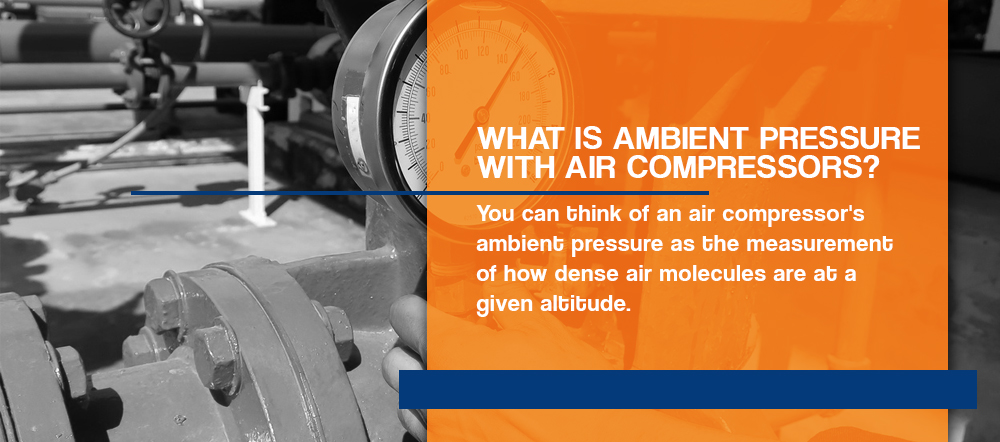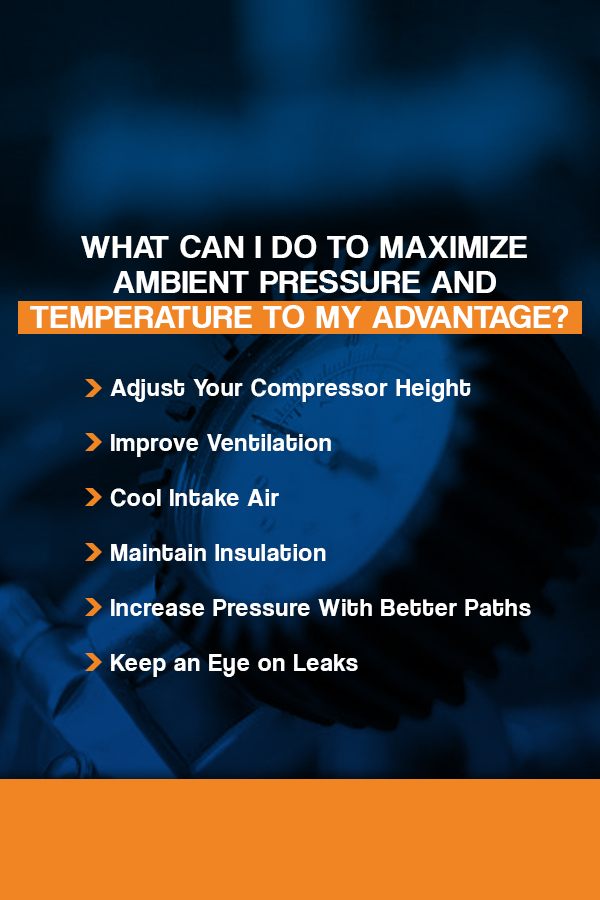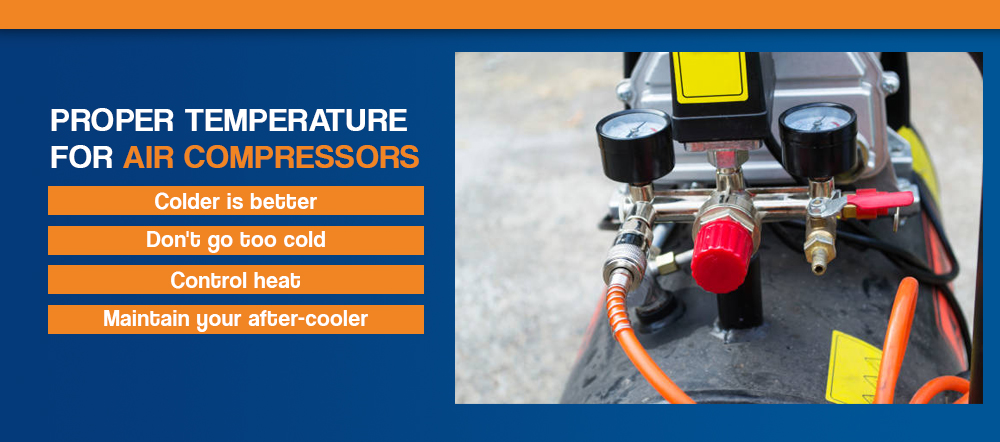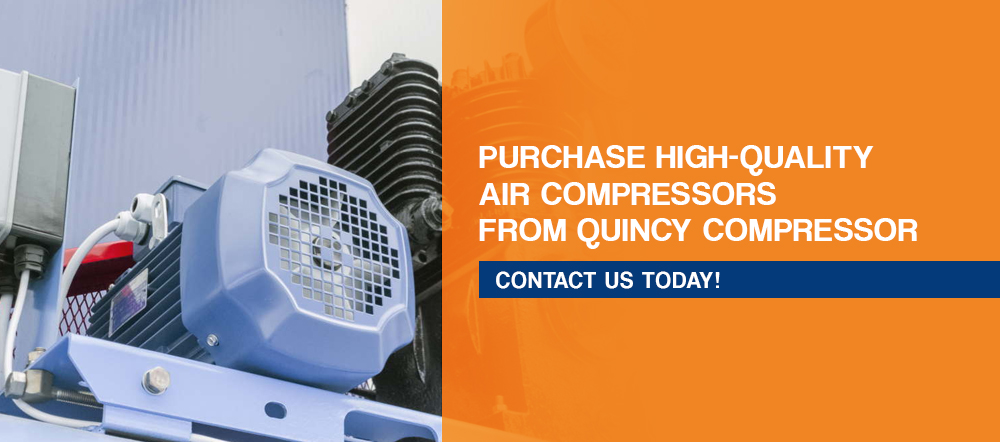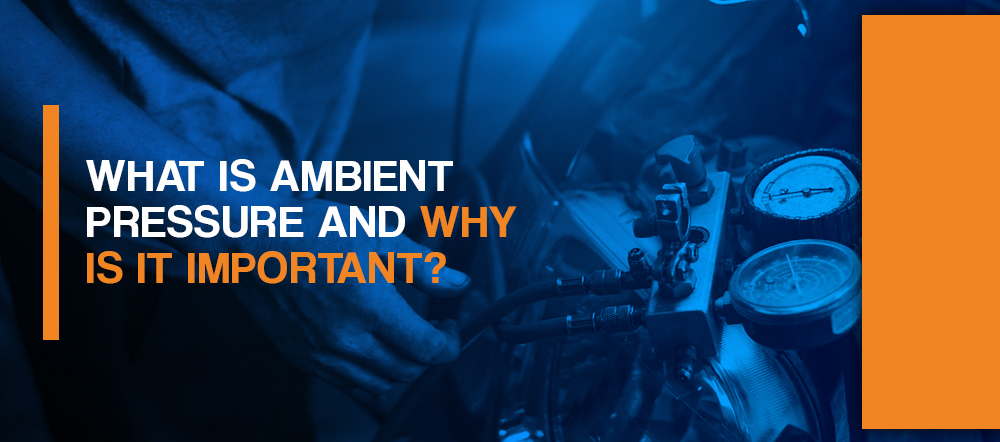
Factories and workshops around the world use air compressors to power tools like grinders, spray guns, sanders, staplers, nail guns and drills. Though air compressors have many applications, optimal working conditions for compressors remain constant. Ambient temperature and ambient pressure — also known as “inlet pressure and temperature” — significantly impact an air compressor’s performance. These terms refer to the temperature and density of the air surrounding a compressor.
In this article, you can learn more about air compressors and how ambient pressure and temperature help them work properly. We’ll also cover the importance of ambient pressure and temperature and the ways you can use these forces to your advantage.
Understanding Air Compressors
Understanding how a compressor works gives you valuable context for ambient pressure and temperature. Many air compressor systems are powered by a diesel or gas engine. Air compressors use the following steps to produce compressed air:
- When you turn on an air compressor system, it begins to draw in the surrounding air.
- This air travels through the compressor intake, where it is compressed into a smaller volume.
- The compressed air is then used to power equipment and tools, or it is sent to an air storage tank to be used later.
- The air compressor stops gathering ambient air if your tools are no longer running or if the compressor’s storage tank is completely full.
Both ambient pressure and temperature impact how your air compressor carries out this process. For example, a decrease in ambient pressure may lead to a drop in a compressor’s compressed air production.
What Is Ambient Pressure With Air Compressors?
The term ambient pressure refers to the pressure of the surrounding air, gas or liquid in contact with an object in a specific location. For air compressors, ambient pressure calculates the air pressure surrounding the device. You can think of an air compressor’s ambient pressure as the measurement of how dense air molecules are at a given altitude.
What Is Ambient Temperature?
Simply put, ambient temperature is the actual temperature of the air surrounding a given area at any given moment. If you’re outside, it’s the temperature of the air around you at the time of measurement, and if you’re inside, it’s the reading of the temperature that exists in the room.
Ambient temperature does not record humidity or wind speed, so it cannot tell you a given location’s “real feel” temperature. It is, however, an important baseline measurement for a given space’s climate, and you can use it to make a wide range of determinations. Ambient temperature can have a strong effect on the quality of air your compressor generates, and it can affect the long-term operating health of your compressor system.
Relationship Between Ambient Temperature and Ambient Pressure
According to Gay-Lussac’s law, the pressure of any gas, including air, held at a constant volume is directly proportional to its Kelvin temperature. This direct correlation means that if one property increases, the other will increase as well:
- If the ambient temperature increases, the ambient pressure will increase.
- If the ambient temperature decreases, the ambient pressure will decrease.
Monitoring the ambient pressure and temperature conditions can help you adapt your air compressor as necessary. For example, a temperature spike could raise the ambient pressure higher than you need it to be.
Typically, you should try to keep an air compressor’s operating temperature somewhere between 50 and 85 degrees Fahrenheit. Operating in conditions lower than 50 degrees can put you at risk of freezing issues, and operating above 85 degrees may cause your air compressor to overheat.
Why Are Ambient Pressure and Temperature Important?
Ambient pressure and temperature directly affect air compressor function. For example, you may notice altitude’s effects on compressors as the pressure and temperature change the higher or lower you go. Even when you are not using an air compressor at extreme altitudes, it is beneficial to check your environment for the following:
- Ambient temperature and pressure increases: If inlet pressure and ambient air temperature increase, your compressor’s ability to operate efficiently may be negatively impacted. When air temperature and pressure increase, the density of the air the compressor is relying on decreases. A compressor can only take in a fixed volume of air, and this density decrease results in the compressor taking in less air.
- Ambient temperature and pressure decreases: If inlet pressure and ambient air temperature decrease, your compressor will not have as much freedom to produce air. Often times, pressure drops due to restrictive inlet filtration and piping or an increase in elevation. It’s important to get a feel for the ambient temperature in your compressor location so you can develop a plan for how you’ll maintain the device and achieve maximum operational efficiency.
How Air Density Affects Air Compressors
Air density refers to the mass per unit of volume of the Earth’s atmosphere. In simpler terms, density tells you how heavy something is and can help you differentiate between products of the same size. For example, think about a loaf of bread and a brick that are the same size. Despite their similarity in size, the brick is going to be much heavier due to its density.
Like the bread and brick example, you can calculate differences in how heavy or light ambient air is by measuring its density. Because air is a gas, its density can fluctuate due to changes in altitude, temperature and humidity. Keep the following air density facts in mind to help improve the performance of your air compressors:
- Denser air is easier to compress: You want the air you’re compressing to be as dense as possible. Density and pressure are linked, so if you have high-density air, you’ll also have high pressure. Since your air compressor is taking in ambient air and turning it into a highly pressurized form, denser air that already has a high pressure is easier for a compressor to work with.
- Denser air has greater outputs: Since dense air is easier to compress, it also produces greater outputs. Your compressor can only take in a set amount of air. Denser air allows your compressor to get the most out of the intake air and translate it into higher-pressure outputs.
- Temperature affects density: Your ambient temperature plays a role in your air’s density. Hotter ambient temperatures decrease the density of your air, while colder ambient temperatures increase the density. Savvy businesses aim to keep their compressor in colder temperatures for optimal compression and greater outputs.
The bottom line? Keep the temperature low and the density high to get more out of your ambient air and receive significant increases in compressor outputs.
What Can I Do to Maximize Ambient Pressure and Temperature to My Advantage?
You can use ambient pressure and temperature to your advantage to keep an air compressor functioning properly. The following tips may help you improve your compressor output, lower your energy costs and optimize your compressor space.
1. Adjust Your Compressor Height
One of the most important factors that affects ambient air temperatures is the areal height at which your compressors are located. At increased altitudes, your compressor needs a greater amount of air at the inlet than it does at lower altitudes. Keep this in mind while researching potential compressor purchases. If your facility is located in an area that’s especially hilly or mountainous, you’ll want to choose a unit that has a higher rating at the inlet.
2. Improve Ventilation
You’ll also want to consider how well-ventilated your space is before purchasing a compressor. A well-ventilated area can help reduce ambient temperature and may have an effect on how much strain is placed on your compressor system. If your facility’s ventilation system hasn’t been evaluated in a while, perhaps now is a good time to assess how it can be upgraded.
3. Cool Intake Air
It requires less energy to compress cooler air than it does to compress warmer air. To save energy and lower your costs as a result, you can cool the air compressor’s intake air. To take this step, move your compressor to a more shaded area or a location where the ambient temperature is naturally cooler.
4. Maintain Insulation
Keeping your ambient temperature and pressure consistent is crucial to keep an air compressor working correctly. If you have your air compressor indoors, you’ll need to check your insulation to make sure your facility’s temperature isn’t affected by seasonal temperature changes. Proper insulation allows you to keep your facility at optimal temperatures, which can lead to better and more consistent compressor output.
5. Increase Pressure With Better Paths
Even if you have the ideal ambient pressure, poorly designed delivery lines can reduce the effectiveness of your air compressor. Delivery lines that are too narrow or have sharp bends may produce less pressure at the point of use. You can get greater pressure for the same amount of energy by straightening out your paths and reducing or eliminating any bends or loops.
6. Keep an Eye on Leaks
Instead of immediately turning up the pressure on your air compressor when you notice it’s not delivering the same amount of power it used to, you’ll want to check for air leaks. If you have a leak, turning up the pressure can harm your air compressor’s internal mechanisms and cause it to break down faster. Regularly perform inspections on the parts that take air to the compressor along with the tools the compressed air is powering.
Proper Temperature for Air Compressors
As discussed earlier, an ambient temperature between 50 and 85 degrees Fahrenheit is ideal for your air compressor. Here are a few more tips you should be aware of to use temperature to your advantage:
- Colder is better: Lower temperatures mean higher air density, and higher density means greater outputs from your air compressor. Colder air is also better since it tends to be drier than warm air. Drier air causes less condensation to form in your air compressor. As a result, the compressor’s filtration system doesn’t have to remove as much moisture and can operate more efficiently. If you’re looking to get the most out of your compressor, make whatever adjustments are possible to get the room cooler and drier.
- Don’t go too cold: While colder air is often better, you don’t want to operate your air compressor in freezing ambient temperatures. If it’s too cold, condensation can freeze in the pipes, drain valves, filters and the air compressor itself. Ice that forms in control lines can also harm your pressure controls, resulting in the compressor producing no pressure or too much of it.
- Control heat: While you try to optimize your ambient temperatures, you might have to work outside or in a building without air conditioning. Warm ambient air is acceptable for an air compressor, but try not to operate past 85 degrees. Once you go over this temperature, it’s likely that your air compressor could overheat and shut down entirely. To keep your air compressor running smoothly in hot environments, you’ll want to use shade, proper ventilation and other pieces of cooling equipment.
- Maintain your after-cooler: One of the most important steps you can take to ensure your air compressor is staying at the proper temperature is to inspect its after-cooler. This device helps to cool air as it passes through the compressor system, ensuring that no air density is lost. In your inspection, check for obstructions or debris that could cause the after-cooler to no longer be effective.
Purchase High-Quality Air Compressors From Quincy Compressor
The best way to apply your ambient pressure and ambient temperature findings is on an air compressor that fits your unique needs. As one of the world leaders in industrial air compressor manufacturing, Quincy Compressor has made its name by providing air compressors that are geared to the specific needs of a variety of industries. No matter how you use your air compressor, Quincy Compressor can deliver the uncompromising reliability and performance you count on.
If you need more information before making a purchase, you can connect with one of our local authorized dealer reps for help navigating the selection process and finding an air compressor that’s ideal for your operations. You can also browse our inventory of Quincy air compressors online.
If you have any questions, don’t hesitate to contact our network of professional and knowledgeable experts today.


